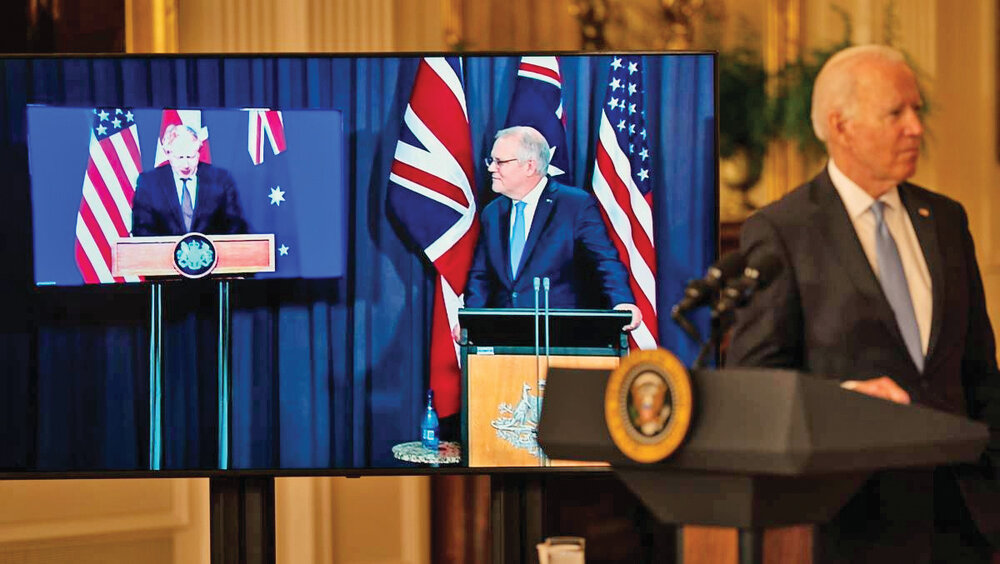China sees AUKUS as a step toward new cold war: ex-Lebanese ambassador to Canada

TEHRAN - A former Lebanese ambassador to Canada, Chile and Poland says that China is being irritated by the AUKUS pact, considering it as a step towards a new cold war.
“China is upset with the AUKUS pact as Beijing considers it a ‘clear provocation by the U.S. Australia’s opting for American submarines which will most probably be deployed in the South China Sea adds to the Chinese unhappiness. China will see this move by the U.S. as a new step toward a renewed cold war,” Massoud Maalouf tells the Tehran Times.
Australia, the UK, and the U.S. and have announced a historic security pact in what is seen as an effort to counter China. It will let Australia build nuclear-powered submarines for the first time, using technology provided by the U.S.
The AUKUS pact, which will also cover AI and other technologies, is one of the countries' biggest defense partnerships in decades, analysts say.
China has condemned the agreement as "extremely irresponsible".
“Tensions between China and the AUKUS countries are expected to rise because these three countries have expressed increased support to Taiwan, which China considers as part of its national territory. Taiwan welcomed and thanked the U.S. and Australia for their ‘firm and open’ support,” Maalouf remarks.
Following is the text of the interview:
Q: What are the implications of the Australia-UK-US (AUKUS) talks over a plan to share technology for nuclear-powered submarines?
A: It is well known that the most important foreign policy challenge to the Biden administration is China. Biden himself cited this in his speech during his first visit to the U.S. State Department on February 4, 2021, soon after taking office.
The new defense pact between Australia, UK, and the U.S. that is known as AUKUS may be one of the U.S. administration’s reactions to this challenge and to counter China’s rising influence in the Indo-Pacific region.
Tensions between China and the AUKUS countries are expected to rise because these three countries have expressed increased support to Taiwan, which China considers as part of its national territory. Taiwan welcomed and thanked the U.S. and Australia for their” firm and open” support.
Q: The West, particularly the U.S., is trying to restrict Iran's nuclear program under the Treaty on the Nonproliferation of nuclear weapons but at the same time they are going to provide nuclear-powered submarines to Australia. Add to it Israel's nuclear weapon arsenals. How can this double standard be justified?
A: Australia recently canceled its order of diesel-powered submarines concluded with France a few years ago. Australia decided to replace them with nuclear-powered submarines from the U.S. These American submarines, which are more powerful and can stay underwater much longer than the diesel-powered ones, are not supposed to carry nuclear weapons. Therefore, they allegedly do not constitute a violation of the Non-Proliferation Treaty (NPT). The NPT restricts only the spread of nuclear weapons and does not preclude countries, including Iran, from using nuclear power for pacific objectives.
Q: Why has France described the pact between the U.S. and Australia as a betrayal? Don’t you think the European states share Washington's concerns about China's rise?
A: France is upset with this development for several reasons:
- France has had historic alliances, interests, and influence in the Indo-China region.
France felt betrayed by the U.S. and Australia for concluding a defense treaty in that region without consulting Paris or without including them, at least in some way, in the deal. France has publicly said it felt stabbed in the back. The inclusion of the United Kingdom into this pact added insult to injury.
- Australia has suddenly canceled a USD $66 billion deal with France which will seriously affect France’s defense industry.
- In April 2022, presidential elections will take place in France and President Macron wants to appear as a serious and strong candidate who preserves France’s interests around the world. His interventions in the East Mediterranean Sea against Turkey, in the catastrophic disintegration of Lebanon, and his participation in organizing the Baghdad summit late last month, is evidence that he is trying to elevate France’s role in world affairs.
Q: Given the recent trans-Atlantic disputes, do you think the EU would go its separate way as some observers are talking about a European NATO?
A: There are some calls within Europe to act more independently, especially after the exit of Great Britain from the European Union. The alignment of Great Britain with the U.S. in the AUKUS pact added to the call for more independence on the part of the European Union (EU). But the EU-U.S. ties are very strong with Europe relying on the U.S. for its defense. This makes a European NATO very difficult to achieve, at least in the foreseeable future. Europe does not seem ready at the moment to separate itself militarily from the U.S.
Q: In your view, what would be China's response to this provocative move? Do you think that accepting Iran as a full member of the Shanghai Cooperation Organization is part of China's reaction?
A: China is upset with the AUKUS pact as Beijing considers it a “clear provocation” by the U.S. Australia’s opting for American submarines which will most probably be deployed in the South China Sea adds to the Chinese unhappiness. China will see this move by the U.S. as a new step toward a renewed cold war.
It will not be that easy for China to accept Iran in the Shanghai Cooperation Organization (SCO) as a full member given that Afghanistan, Belarus, and Mongolia have observer status as well. Will these three countries be consulted by China on the possibility of accepting Iran as a full member of the SCO? Will they be invited by China to become full members too? It all depends on how China evaluates these new regional developments in terms of its national security.
